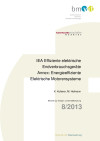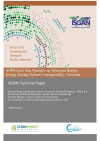Suchergebnisse
IEA Effiziente elektrische Endverbrauchsgeräte, Annex: Energieeffiziente Elektrische Motorensysteme

Schriftenreihe
08/2013
K. Kulterer, M. Hofmann
Herausgeber: BMVIT
Deutsch, 55 Seiten
Downloads zur Publikation
IEA HPT Annex 49: Evaluation of Efficiency and Renewable Energy Measures Considering the Future Energy Mix (2018)

In diesem Beitrag wird - am Beispiel eines realisierten Null-Energie-Mehrfamilienhauses - eine Primärenergie-Bewertungsmethode diskutiert, die es erlaubt, die zukünftige Entwicklung von Last (d.h. Gebäudebestand) und Strom-Mix (Anteil der REs) mit saisonalen Schwankungen einzubeziehen und die Auswirkungen auf die Rangfolge verschiedener passiver und aktiver Technologien aufzuzeigen.
Ochs, Fabian; Dermentzis, Georgios
Herausgeber: IEA HPT, 2018
Englisch, 7 Seiten
Downloads zur Publikation
IEA 4E EMSA Workshop: How can digitalisation in industrial electric motor driven systems contribute to saving more energy?
19. September 2023
Vienna, AT
Following the presentation of the latest results of the Electric Motor Systems Annex research on digitalisation, we would like to discuss on market and technology trends as well as energy effects, best practices and policies.
IEA-ISGAN Annex 5 (SIRFN): Draft Test Protocols for Advanced Battery Energy Storage System Interoperability Functions

Im Rahmen von IEA-ISGAN-SIRFN wurden umfassende Prüfverfahren für die Validierung der Interoperabilität von Batteriespeichersystemen entwickelt.
Herausgeber: IEA-ISGAN, SIRFN
Englisch, 71 Seiten
Downloads zur Publikation
IEA EBC Annex 61 Subtask A report: Deep Energy Retrofit - A Guide to Achieving Significant Energy Use Reduction with Major Renovation Projects (2017)

Der Bericht gibt einen umfassenden Überblick über die wichtigsten ökonomischen und technischen Konzepte für die hochwertige Sanierung von öffentlichen Gebäuden.
Alexander Zhivov, Lohse Rüdiger
Herausgeber: New Buildings Institute (NBI)
Englisch, 522 Seiten
Downloads zur Publikation
Webinar "Using Metal Oxide Semiconductor (MOS) sensors to measure Volatile Organic Compounds (VOC) for ventilation control"

Teilnehmer der IEA EBC Annex 68 präsentieren in diesem Webinar erste Forschungsergebnisse und Ihre Einschätzung in Bezug auf die Verwendung von Metalloxid-Sensoren (MOS) für die Regelung von Lüftungsanlagen.
Herausgeber: Air Infiltration and Ventilation Centre (AIVC)
Englisch
IEA HPT Annex 50 und 51: Vortrag "Innovative Akustik-Gadgets für die Praxis und die dafür benötigten HighTech-Messverfahren" (2020)

Dieser Vortrag wurde im Rahmen des ersten Termins der Online-Seminarreihe "Wärmepumpen in MFH und Akustik von Wärmepumpen" zur Dissemination der Aktivitäten im IEA HPT Annex 50 sowie im IEA HPT Annex 51, gehalten.
Christoph Reichl
Herausgeber: AIT Austrian Institute of Technology
Deutsch, 48 Seiten
IEA EBC Annex 86: AIVC 2022 Konferenzbeitrag "Assessing demand-controlled ventilation strategies based on one CO2 sensor"

Der Konferenzbeitrag zeigt die Möglichkeiten und Grenzen einer bedarfsgeführten Lüftungsregelung welche auf einem zentral angeordneten CO2 Sensor, z.B. im Abluftkanal, basiert.
Gabriel Rojas
Herausgeber: AIVC Konferenzbeitrag
Englisch
The Contribution of Advanced Renewable Transport Fuels to the Decarbonisation of Transport in 2030 and beyond
18. November 2019
Albert Borschette Conference Centre, Rue Froissart 36, 1040 Etterbeek, Brussels, BE
The European Commission Directorate General for Energy has been supporting an International Energy Agency (IEA) study on this topic carried out by two IEA Technology Collaboration Programmes, IEA Bioenergy TCP and the IEA Advanced Motor Fuels TCP. The workshop will present the findings of this project focusing on country-specific analysis of Germany, Finland, Sweden, USA and Brazil.
IEA IETS Annex 15: Optimal Integration of a Stratified Thermal Energy Storage into a Multi-Component Industrial Energy System (2020)

In dem Beitrag wurde ein im Zuge des Forschungsprojektes EDCSproof entwickeltes Optimierungsmodell für zentral eingebundene Schichtspeicher vorgestellt und seine Funktion in Anlehnung an einen realen Anwendungsfall demonstriert.
Dipl.-Ing. Karl-Wilhelm Schenzel, Univ.Prof. Dr. René Hofmann
Herausgeber: Institut für Energietechnik und Thermodynamik, TU Wien
Englisch, 6 Seiten
European Networking Group Workshop: Harmonization and Standardization of Electric Road Systems - Roadside Infrastructure
27. - 28. March 2023
University of Applied Sciences Erfurt, Altonaer Straße 25, 99086 Erfurt, DE
This Workshop aims to initiate harmonization processes for standards and regulations with context to roadside equipment for Electric Road Systems (ERS). A consensus between the different existing ERS technologies should be found and new ways to unearth compatible solutions implementing ERS in Europe should be started.
Collaborative Development of Automated Advanced Interoperability Certification Test Protocols for PV Smart Grid Integration

Im Rahmen von IEA-ISGAN-SIRFN wurden von AIT (Österreich), SANDIA National Laboratories (USA) und TECNALIA (Spanien) Testverfahren entwickelt, mit deren Hilfe die Smart Grids Funktionen von Photovoltaik Leistungsumrichtern umfassend validiert werden können.
AFC TCP 2019 Survey on the Number of Fuel Cell Vehicles, Hydrogen Refueling Stations and Targets (2019)

Schwerpunktthema ist eine innerhalb der IEA Technology Collaboration Programme-Teilnehmern durchgeführte Umfrage betreffend Brennstoffzellenfahrzeugbestand sowie der Anzahl der Wasserstofftankstellen mit Ende 2018. Ebenfalls werden die bekanntgemachten Ziele, Visionen und Prognosen im Hinblick auf die Entwicklung der Anzahl der Brennstoffzellenfahrzeuge - unterteilt in Personenkraftwagen, Lastkraftwagen und Busse - und der Anzahl der Wasserstofftankstellen bis 2050 dargestellt.
Data collection by Advanced Fuel Cells Technology Collaboration Programme (AFC TCP) Executive Committee Members, coordinated by the core group (L. Antoni, N. Garland, J. Han, M. Rex and R.C. Samsun). The results are originally provided to IEA Global EV Outlook 2019 publication.
Herausgeber: IEA Technology Collaboration Programme Advanced Fuel Cells
Englisch, 7 Seiten
Downloads zur Publikation
IEA AFC Annex 34 - Buch: Hydrogen in Automotive Engineering: Production, Storage, Application (2023)

Dieses Buch gibt einen umfassender Überblick über die Eigenschaften, Herstellung, Speicherung und Anwendung von Wasserstoff, über die technologischen Eigenschaften von Brennstoffzellen speziell mit Wasserstoff und über Normen und Sicherheitsfragen für Wasserstoff.
Klell, M., Eichlseder, H., & Trattner, A.
Herausgeber: Springer Fachmedien Wiesbaden GmbH
Englisch, 308 Seiten
Information zum Start des IEA Users TCP Tasks Social License to Automate 2.0 in den sozialen Medien (2022)

In diesen Newsbeiträgen für soziale Medien wird zum Start des Tasks Social License to Automate 2.0 informiert und es werden die Inhalte und Ziele, sowie die aktuell mitwirkenden Länder, die Inhalte und Ziele, sowie die aktuellen Mitwirkenden vorgestellt.
Lisa Diamond (AIT), Peter Fröhlich (AIT), Andrea Werner (FH Technikum Wien)
Herausgeber: AIT LinkedIn- und Facebook-Seite
Deutsch
IEA HPT Annex 56: Interconnected heat pumps in Austria - A technology implementation survey (2023)

Diese Publikation stellt die Ergebnisse einer in der österreichischen Wärmepumpenbranche durchgeführten Umfrage bezüglich der Relevanz vernetzter Wärmepumpen, Stand der Technik Lösungen, sowie Technologietrends vor.
Veronika Wilk; Reinhard Jentsch; Tilman Barz (alle Austrian Institute of Technology GmbH)
Herausgeber: IEA Heat Pump Centre
Englisch, 7 Seiten
Whitepaper "Smart Grids: Real Case Experiences and Regional Perspectives in Mannheim and Salzburg"

Flexible Mechanismen sind eine Vorrausetzung einer Transformation des Energiesystems hin zu einer nachhaltigen Versorgung. Dabei bilden Smart Grids die Grundlage für das neue Netz und den Marktfunktionen, die sich nach Bedürfnissen und Eigenschaften der Verbraucher richten.
IEA SHC Task 59: Experimental measurement of materials drying coefficient for internal insulation: new approaches for laboratory testing (2021)

Experimentelle Messung des Trocknungskoeffizienten von Materialien für die Innendämmung: neue Ansätze für Labortests.
Alexander Rieser, Daniel Herrera -Avellanosa, Eleonora Leonardi, Marco Larcher, Rainer Pfluger, Alexandra Troi
Herausgeber: SBE 21 Heritage Konferenz Bozen
Englisch, 8 Seiten
IEA HPT Annex 56: Soft sensors for heat pump icing - Datenblatt zu IoT Projekten und Produkten (2023)

Das Datenblatt gibt einen kompakten Überblick über die Entwicklung eines Softsensors für die Vereisung von Wärmepumpen.
Herausgeber: AIT Austrian Institute of Technology
Englisch, 2 Seiten
Downloads zur Publikation
IEA HPP Annex 47: Simulation based analysis of demand side management as enabler for the integration of heat pumps in district heating networks

In der Präsentation wurden Ergebnisse aus dem laufenden Projekt bezüglich Modellierung und dynamischer Bewertung zur Evaluierung von Betriebsstrategien gezeigt, dessen Ergebnisse in den IEA HPP Annex 47 eingebracht werden.
Daniele Basciotti, Ankit Takle, Ralf-Roman Schmidt
Herausgeber: Austrian Institute of Technology
Englisch, 15 Seiten
